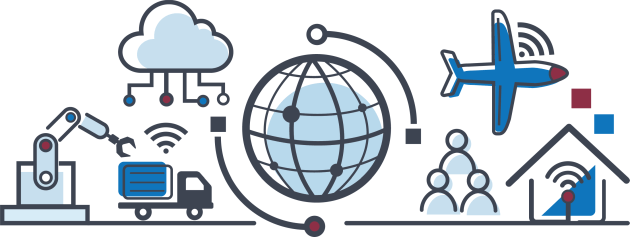As we speak, we are witnesses of the Internet of Things changing our world into a smarter place for us to live and work in. An impactful part of the larger IoT system is the Industrial Internet of Things (IIoT) which integrates “things” to built solutions for the business environment.

The logic behind the Industrial IoT
Industrial IoT systems interconnects smart sensors, software platforms, applications, clouds, tools and devices. For instance, in manufacturing smart sensors are deployed at every phase of the process serving various operations. This sensor network sends real-time data to the IoT gateway. Imagine it like a hub between IoT devices and cloud receiving and sending data to the cloud application server to be processed and analyzed. Complex applications are constantly developed to manage large amount of data in an accessible and secure manner just by using the now banal smartphones.
Let’s find out what are the major applications of IoT in industry based on a selection from Ropardo portfolio of IOT integration solutions. For similar results don’t hesitate to contact us.
Areas of Applications of IIoT
1. Industrial Process Automation
Automation of machines and tools ensure efficient operations for companies that use sophisticated software tools to monitor and improve their business processes. IoT systems enhance efficiency and precision, ensure remote access and easy control, reduce errors.
2. Factories of the Future
In smart factories IoT systems interconnects major components such as machines, tools and sensors into a network allowing easier management and access. Industrial IoT solutions allows workers to carry out certain operations remotely: process flow overview, downtime monitoring, inventory status checking, shipment, schedule maintenance and interrupting particular processes for further analysis etc.
Integrating smart sensors into tools and machines allows workers to carry out their tasks efficiently. Specially designed wearables and smart glasses help employees to reduce error and improve safety at the working environments. For instance, RoboHMI is a Human-Machine Interface that offers an improved human-robot experience with easy control, personalization and monitoring of the integrated exoskeleton to reduce industry-specific medical conditions and ensure professional healthcare while enhancing production.
3. Smart Analytics & Predictions
Companies implement customized software for detailed analysis of huge amount of data collected from large sensor networks and machines. Detailed analysis of data and understanding the behavior over time gives much better insight on processes and facilitates strategical decisions for product optimization and not only.
Based on smart analytics machines predictions are made for various purposes. For instance, p\Predictive maintenance is an effective solution to avoid unnecessary downtime in the production line. Smart sensors integrated in IoT systems continuously monitor the status major components and detect critical issues before the production is completely down.
4. Digital Healthcare
Digitization of healthcare services has brought considerable advances in the occupational health field. Monitoring of the CO2 and radiation level in industrial areas is one practical application of the Industrial Internet of Things.
Our ROHEALTH is an IoT platform that puts together an amazingly rich range of mobile and web apps, devices, cloud services, wearables, people and professionals.
5. Smart Logistics Management
Logistics is a key part of the industrial process in many business areas and IoT solutions respond to increasing quality expectations. Smart sensor integration streamlines many of the complex logistics operations and helps manage goods efficiently or track fleet location.
Smart packaging ensures accessibility and efficiency in the supply chain management. Smart sensors monitor packing stages and update status in real-time. Embedded sensors detect vibrations, atmospheric conditions like temperature and humidity and send alerts in case of events during transit or storage.
Cockpit is such an app built with IoT technology as a set of monitoring apps to monitor, display and analyze data collected from multiple modules being successfully used in food transportation industry. CockPit monitors in real-time the temperature in trucks by reading multiple sensors integrated in euro pallets. A constant temperature is maintained despite the large size of trucks. Thus, complaint rates decrease significantly.
6. Manufacturing process monitoring
Bringing IoT technology in manufacturing industry ensured massive improvement of product quality. Continuous monitoring and analysis of every stage ensure better quality by improving prompting necessary action at time.
7. Autonomous vehicles
An application of the IoT technology in the automotive industry consists in enabling self-driving vehicles to supply goods and manage logistics within the company premises. Or, using drones for short-distance delivery transportation. Or, smart vehicles can detect traffic congestion on the route and make detours to reach destination in best time possible.
8. Power Management
IoT technology makes available solutions that are designed to protect the environment by enabling an efficient power management in various industries. Specialized sensors detect the habitat and set off apps to turn on/off lights, air conditioners, humidity controls, liquid flow.
Brief list of IIoT advantages
- Product and process optimization
- Higher efficiency
- Shorter time to market
- Predictive maintenance and analysis
- Shortened down time for machines and process
- Remote monitoring and accessibility
- Enhanced security
- Solution scalability
- Enhanced sharpness
- Cost effectiveness
Conclusion
The fast growing IoT technology transform industries and manufacturing units in terms of process improvements, better management, cost effectiveness and overall efficiency. Factories of the future will capitalize IoT capacities for product optimization by analyzing big data collected from a variety of sensors.

